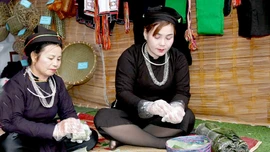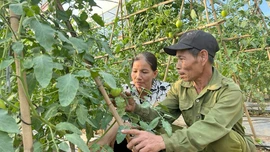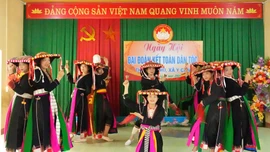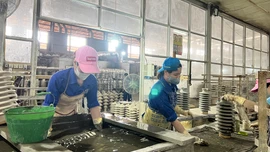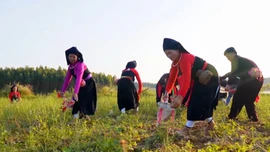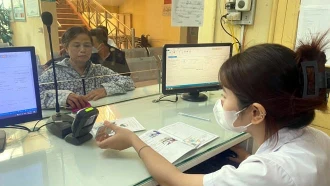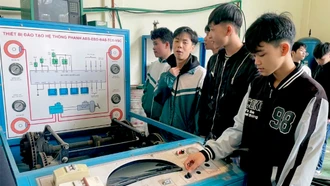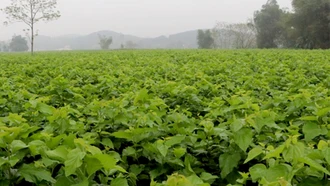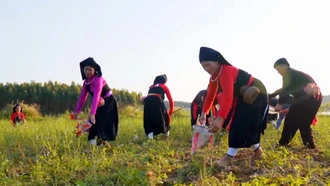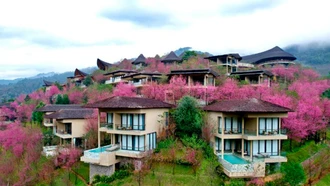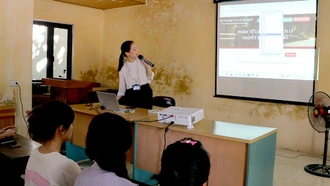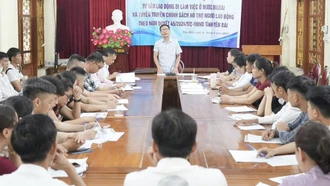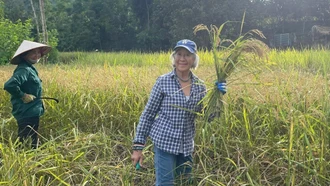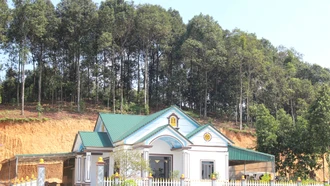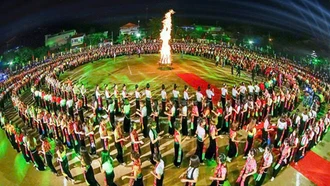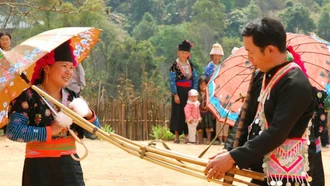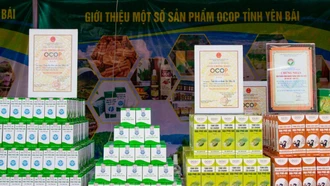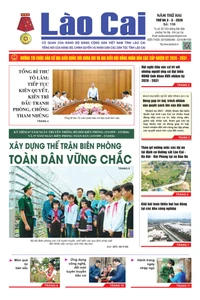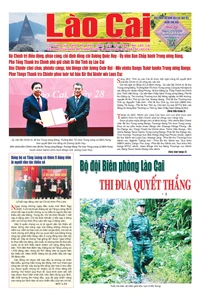Located about 20 kilometers from the district center, the Phinh Ho resettlement hamlet in De Xu Phinh Commune nestles along a mountainside, surrounded by lush pine forests and murmuring streams. Few would believe that this now peaceful place was once a disaster hotspot — the site of a devastating flash flood in 2017, which forced over 70 households from Nam Kim, Nam Pa, and De Xu Phinh hamlets to evacuate. Eight years later, concrete roads stretch across the hamlet, and 100% of households have secured stable housing. They have also received support in the form of production land, sturdy homes, livelihood tools, and essential infrastructure including schools, health stations, and roads.
Mr. Hang Cho Tua, a resident of Phinh Ho, shared: "My family was granted nearly 1 hectare of farmland. We now grow maize, rice, and vegetables. Not only do we have enough to eat, but we can also sell the surplus at the market for a steady income.†Today, Phinh Ho is no longer a land of loss, but a symbol of renewal. Its residents are committed to staying, farming, and gradually improving their incomes and quality of life.
In Hong Nhi Pa hamlet, Lao Chai Commune — an area heavily affected by the August 2023 flood — local life is also regaining stability. Sturdy new homes now line the hillside, interwoven with the cheerful sounds of families rebuilding their lives.
Mr. Thao A De, a poor household whose home was entirely swept away by the flood, recalled emotionally: "After the flood, all we had left were the clothes on our backs. Thankfully, with VND 40 million in aid and a plot of land, my family quickly built a solid three-room house with a kitchen and toilet. Living here in the resettlement area, I feel safe — no longer worried each time it rains.â€
All 13 households whose homes were destroyed have now completed new houses. Additionally, 100% of families in high-risk zones have been relocated to safe areas. The local government proactively planned and allocated plots to families without land, ensuring secure resettlement. Meanwhile, villagers are actively restoring their livelihoods. To date, 37 hectares of irrigated rice fields have been revived, with 33 hectares capable of producing two crops per year. Many households have also developed livestock farming — raising specialty pigs, buffaloes, and cows — through models supported by the province.
Mr. Cu A Du, head of the hamlet, noted: "Our village now has four large-scale livestock farming models. Every household raises animals for daily use, and some even earn extra income — gradually escaping poverty.†By the end of 2024, the number of poor households in the hamlet dropped to 54 out of 98; among the families whose homes were destroyed, two have already escaped poverty.
Ho Bon Commune was the hardest hit in the August 2023 flood, with 91 homes affected — 21 of which were completely swept away. Immediately after the disaster, the commune quickly identified safe land and relocated affected households.
Mr. Giang A Chong, a resident of Trong La hamlet, recounted emotionally: "After the flood, my entire house and possessions were gone. But thanks to timely government support, I was able to rebuild a spacious house of more than 300 square meters. Now that we live in a safe place, we no longer worry whenever the rainy season comes.â€
Since early 2025, the commune’s authorities have continued to survey households in high-risk areas for proactive relocation. Mr. Sung A Khang, Vice Chairman of the commune People’s Committee, shared: "We have successfully persuaded and relocated one household from a serious landslide area. We continue to monitor the weather to respond promptly and ensure the absolute safety of our residents.â€
Beyond housing support, Mu Cang Chai District is also working to issue land use right certificates (red books) to resettled households. Mr. Sung A Chua, Vice Chairman of the District People’s Committee, emphasized: "Granting red books not only affirms legal ownership for the people but also instills trust, helping residents feel secure and invest in long-term development.â€
Alongside stabilization efforts, the district is implementing strong preventive measures. Localities are developing "four-on-the-spot†response plans, reviewing and listing households in landslide-prone areas for proactive relocation before the rainy season. The political system from district to commune and village levels is fully mobilized and ready to respond to any situation.
From days of hardship, the resettlement areas of Mu Cang Chai have given the highland people not only new homes but also renewed hope, faith, and the will to rise again. This revival is the result of unity — from the leadership to each individual — writing a new chapter for a land that refuses to be defeated by natural disasters.
Hong Duyen







